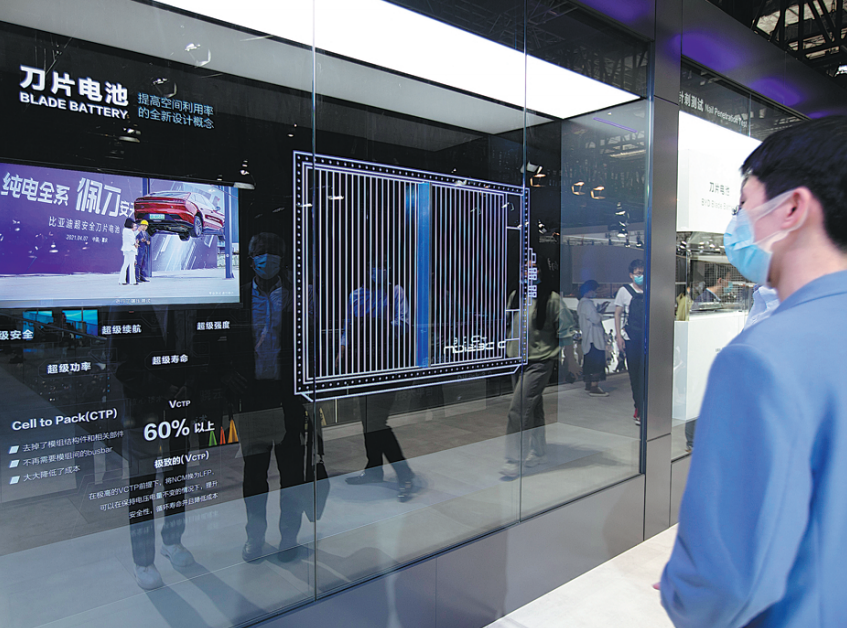Lithium demand sees battery firms expand

Chinese corporations boosted as Europe and South America among largest areas of growth
Chinese lithium companies are accelerating their entry into overseas markets as demand in the renewable energy industry surges.
Ganfeng Lithium Company, based in Jiangxi province, signed a deal with Argentina to build a lithium-ion battery factory in Jujuy province last month.
The project, in which Ganfeng has a 51 percent stake, will produce 40,000 metric tons of lithium carbonate equivalents per year and is scheduled to begin production in the first half of next year.
Earlier in May, Ganfeng said it will buy out London-listed Mexican miner Bacanora Lithium in a deal valued at up to 190 million pounds ($264 million).
The company's main asset is the Sonora project in Mexico, which is among the world's largest projects for the mining of lithium clays with estimated reserves of 8.82 million tons of lithium carbonate equivalents.
According to in-en.com, there were 11 domestic lithium companies expanding into overseas markets by the end of May.
In March, BYD's battery arm FinDreams Battery said it is preparing to build its first overseas battery factory.
FinDreams Battery job postings showed the battery factory is mainly responsible for the production, packaging, storage and transportation of lithium-ion power batteries. It has work locations in Shenzhen and Europe.
"The plant is being prepared for the supply of European automotive customers and the further expansion of BYD's overseas business," said Li Yunfei, general manager of BYD's branding and public relations department.
BYD announced the launch of the blade-shaped battery in March last year and the establishment of five subsidiaries under the name "FinDreams" to speed up sales of the core component for new energy vehicles.
Fujian-based battery giant CATL has its first overseas plant in Thuringia, Germany, which started construction in 2019.
The firm says it's focused on building "long-term cooperation with international automakers." CATL earned about 16 percent of its revenue from overseas sales last year, up from 4 percent in 2019, according to BloombergNEF. Its overseas partners include Daimler and Volkswagen.
CATL surpassed 1 trillion yuan ($156.02 billion) in market value in the end of May, becoming the first A-share company backed by Chinese private equity and venture capital investors to do so.
Plans for Chinese battery makers Farasis Energy and Svolt Energy to land in Germany are also moving forward.
Yale Zhang, managing director of consulting company Automotive Foresight, said Chinese lithium companies going abroad will help them be closer to their customers, which are global carmakers and battery raw material producers.
These battery makers have undeniable advantages in battery performance and safety, such as BYD's blade-shaped battery and CATL's CTP (Cell To Pack) battery technology, Zhang added.
According to South Korea's SNE Research, global electric-vehicle battery sales more than doubled in the first four months of the year as the switch to environmentally-friendly cars picked up momentum. Sales of EV batteries rose to 65.9 gigawatt-hours from January to April, up from 26.8 GWh a year earlier.
CATL's sales almost quadrupled to 21.4 GWh, cementing the Chinese company's position as the world's biggest EV battery maker with 32.5 percent of the global market.
"CATL, BYD and other Chinese makers led the market growth," SNE said in the statement. "With the Chinese market expected to continue expanding, growth for most of the Chinese companies is expected to exceed the market average."
EV sales in China may climb more than 50 percent this year alone, according to research firm Canalys.
Roy Lu, director of the Gasgoo Auto Research Institute, a think tank for the industry, said as countries work to reduce carbon emissions and demand for electric vehicles increases, Chinese battery makers are taking advantage of the opportunity to grow into global energy companies.
Battery companies that have gone abroad have strength in capital, technology, manufacturing capital and price, which help them to gain overseas market shares, Lu said.
Some European carmakers and governments hope that Chinese battery companies will build factories in their land to ensure a stable battery supply and promote the transformation of local energy supply, he added.

